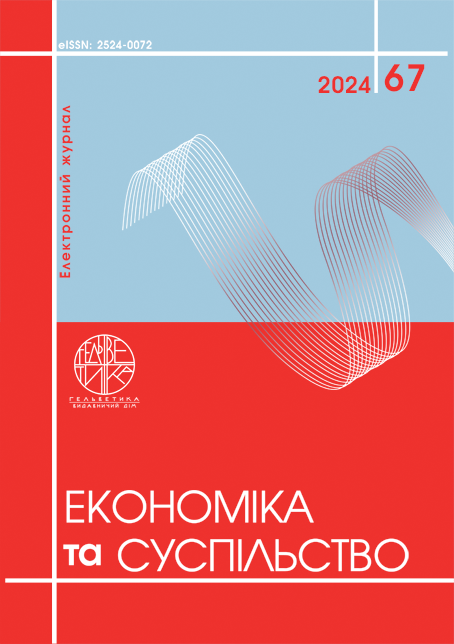КОНЦЕПЦІЯ «SMART-ЕКОНОМІКИ»: ВИКЛИКИ ТА ПЕРСПЕКТИВИ ДЛЯ БІЗНЕСУ В УМОВАХ ГЛОБАЛІЗАЦІЇ
Анотація
Стаття сфокусована на критичному аналізі концепції «smart-економіки» як сучасної парадигми економічного розвитку, що базується на всеохоплюючому впровадженні цифрових технологій та інновацій в бізнесі. Розглянуто ключові виклики, пов’язані з цифровою трансформацією бізнес-суб’єктів, зокрема зростання технологічної залежності, соціальної нерівності та кіберзагроз. Визначено перспективи розвитку «smart-економіки» через використання передових технологічних рішень, які підвищують ефективність управління та виробничих процесів. Особливу увагу приділено ролі людського капіталу та креативності у забезпеченні конкурентоспроможності бізнесу на глобальному рівні. Аргументована необхідність мінімізації негативних наслідків цифровізації в контексті імплементації ідеї «smart» для економічного зростання.
Посилання
Воронкова В., Череп А., Череп О. Вплив глобальних трендів діджиталізації на сучасний економічний розвиток: нові можливості та виклики. Humanities Studies. 2023. № 17 (94). С. 200–208.
Воронкова В. Г., Нікітенко В. О., Метеленко Н. Г. Еволюція концепції від смарт-освіти до смарт-економіки та смарт-бізнесу. Економіка та суспільство. 2023. №48. URL: https://economyandsociety.in.ua/index.php/journal/article/view/2206
Урікова О. М., Воробій Х. Р., Косик В. М. Смарт-економіка та перспективи її розвитку. Наукові перспективи. 2022. № 11 (29). С. 267–278.
Северин-Мрачковська Л. В. Концепція смарт-економіки в економіко-філософському дискурсі. Вісник КНЕУ. 2021. № 2. С. 87–96.
Сунцова О. Економетрична та цифрова трансформація бізнесу в концепціях індустрія 4.0 та 5.0. Фінансово-кредитні системи: перспективи розвитку. 2022. № 2 (5). С. 36–47.
Федотова Ю. В. Смарт-економіка: характерні риси та еволюція. Проблеми та перспективи формування національної гуманітарно-технічної еліти: збірник наукових праць: матеріали міжнародної науково-практичної конференції: "Духовно-моральнісні основи та відповідальність особистості у долі людської цивілізації" (16.11.2016 р.). Харків : НТУ "ХПІ". 2016. Т. 1. № 47 (51). С. 195–200.
Apostol D., Balaceanu C, Constantinescu E. Smart-economy concept – facts and perspectives. HOLISTICA Journal of Business and Public Administration. 2015. № 6 (3). P. 67–77.
Bulkot O. Formation of Ukraine’s smart economy in the Context of Global Challenges. Futurity Economics & Law. 2021. № 1 (1). P. 11–23.
Caragliu A., Nijkamp P. The impact of regional absorptive capacity on spatial knowledge spillovers: the Cohen and Levinthal model revisited. Applied Economics. 2012. № 44 (11). P. 1363–1374.
Environmental Protection Agency. Framework for creating a smart growth. Economic development strategy. URL: https://www.epa.gov/
Impacts of the digital economy on the food chain and the CAP / Research for AGRI Committee of EP. Policy Department for Structural and Cohesion Policies Directorate – General for Internal Policies. 2019. С. 80 URL: https://www.europarl.europa.eu/RegData/etudes/STUD/2019/629192/IPOL_STU(2019)629192_ EN.pdf
Zhyvko Z., Stadnyk M., Shehynska A., Zhyvko O. Managemet of innovative development of enterprises in the smart economy. Economics, Finance and Management Review. 2024. № 2 (18). P. 44–50.
Voronkova V., Cherep A., Cherep O. (2023) Vplyv hlobalnykh trendiv didzhytalizatsii na suchasnyi ekonomichnyi rozvytok: novi mozhlyvosti ta vyklyky.[ The impact of global digitization trends on modern economic development: new opportunities and challenges]. Humanities Studies, no 17 (94), pp. 200–208.
Voronkova V. H., Nikitenko V. O., Metelenko N. H. (2023) Evoliutsiia kontseptsii vid smart-osvity do smart-ekonomiky ta smart-biznesu. [Evolution of the concept from smart education to smart economy and smart business]. Ekonomika ta suspilstvo, no 48. Available at: https://economyandsociety.in.ua/index.php/journal/article/view/2206
Urikova O. M., Vorobii Kh. R., Kosyk V. M. (2022) Smart-ekonomika ta perspektyvy yii rozvytku. [Smart economy and prospects for its development]. Naukovi perspektyvy, no 11 (29), pp. 267–278.
Severyn-Mrachkovska L. V. (2021) Kontseptsiia smart-ekonomiky v ekonomiko-filosofskomu dyskursi. [The concept of smart economy in economic and philosophical discourse]. Visnyk KNEU, no 2, pp. 87–96.
Suntsova O. (2022) Ekonometrychna ta tsyfrova transformatsiia biznesu v kontseptsiiakh industriia 4.0 ta 5.0. [Econometric and digital transformation of business in the concepts of Industry 4.0 and 5.0]. Finansovo-kredytni systemy: perspektyvy rozvytku, no 2 (5), pp. 36–47.
Fedotova Yu. V. (2016) Smart-ekonomika: kharakterni rysy ta evoliutsiia. [Smart economy: characteristic features and evolution]. Problemy ta perspektyvy formuvannia natsionalnoi humanitarno-tekhnichnoi elity: zbirnyk naukovykh prats: materialy mizhnarodnoi naukovo-praktychnoi konferentsii: "Dukhovno-moralnisni osnovy ta vidpovidalnist osobystosti u doli liudskoi tsyvilizatsii" (16.11.2016 r.). Kharkiv: NTU "KhPI". T. 1, no 47 (51), pp. 195–200.
Apostol D., Balaceanu C, Constantinescu E. (2015) Smart-economy concept – facts and perspectives. HOLISTICA Journal of Business and Public Administration, no 6 (3), pp. 67–77.
Bulkot O. (2021) Formation of Ukraine’s smart economy in the Context of Global Challenges. Futurity Economics & Law, no 1 (1), pp. 11–23.
Caragliu A., Nijkamp P. (2012) The impact of regional absorptive capacity on spatial knowledge spillovers: the Cohen and Levinthal model revisited. Applied Economics, no 44 (11), pp. 1363–1374.
Environmental Protection Agency. Framework for creating a smart growth. Economic development strategy. Available at: https://www.epa.gov/
Impacts of the digital economy on the food chain and the CAP / Research for AGRI Committee of EP. Policy Department for Structural and Cohesion Policies Directorate – General for Internal Policies. (2019) 80 p. Available at: https://www.europarl.europa.eu/RegData/etudes/STUD/2019/629192/IPOL_STU(2019)629192_ EN.pdf
Zhyvko Z., Stadnyk M., Shehynska A., Zhyvko O. (2024) Managemet of innovative development of enterprises in the smart economy. Economics, Finance and Management Review, no 2. (18), pp. 44–50.

Ця робота ліцензується відповідно до Creative Commons Attribution 4.0 International License.


